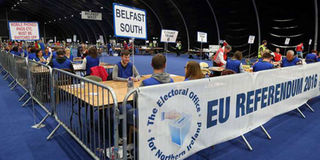Post-truth political culture makes reporters’ work difficult

Ballots are counted at the Titanic Exhibition centre, the Belfast count centre, on June 23, 2016 after polls closed in the referendum on whether the United Kingdom would remain in or leave the European Union. PHOTO | PAUL FAITH | AFP
What you need to know:
It is also very easy for people to cherry-pick information and arrive at whatever conclusions they desire, and media manipulation becomes the order of the day.
This makes the role of the media in purveying the truth much more difficult.
In November, last year, the Oxford Dictionaries declared “post-truth” as its 2016 international word of the year. It defines “post-truth” as a condition “in which objective facts are less influential in shaping public opinion than appeals to emotion and personal belief.”
The selection of the word followed the Brexit referendum in June and the US presidential election in November in which post-truth and post-truth politics influenced the outcomes.
In Kenya, we have been living in a post-truth political culture since the 2007-2008 general Election and the ethnic violence that followed fuelled by the use of social media, including blogs, tweets, Facebook posts and mobile phone text messaging as sources of information, misinformation and fake news.
In this election year, in particular, post-truth frames our conversations, politics and even how we deal with such civil matters as the doctors’ strike and voter registration.
A striking example of how post-truth and post-truth politics influence our conversations is NTV’s show “AM Live People & Politics”, which is hosted by Debarl Inea and often features a university professor and some well-known politicians. In that show, at least on occasions when I have watched it, emotions and personal beliefs devoid of objective facts rule, and generalisations become facts and lies become alternative facts. In this post-truth political culture, even journalists who are supposed to be purveyors of objective facts may knowingly or unknowingly aid in the falsifying of truth as they rely on what is “trending” as sources of news and information.
It is also very easy for people to cherry-pick information and arrive at whatever conclusions they desire, and media manipulation becomes the order of the day. This makes the role of the media in purveying the truth much more difficult. In the circumstances, the Daily Nation’s series of articles, 2017 Elections Agenda, is a commendable conversation for establishing the truth as we approach the General Election. Truth is the greatest defender of democracy.
***
David Ndii’s special reports
In my line of work, I rarely get readers writing in to praise Nation Media Group columnists who are arguably the most complained about for what they write. So it was a rare gem when I received the following message from Baru Wang’ombe on Monday this week commenting on David Ndii’s article, “Are mega projects worth billions spent?”, published in the Saturday Nation on February 11:
“That was a really excellent piece on mega projects that you wrote … Well-researched, logical, factual and well- written. The facts led to the conclusions, rather than the other way round. Simple and clear, yet still a very interesting read. I appreciated the lack of the excessive hyperbole, obvious partisanship, and gratuitous insults that are all too common in Kenyan opinion pieces these days.
“And it didn’t even have the usual grammatical errors that might be avoided if the Nation and other papers hired an editor or two … I was really heartened to find that we still have some worthwhile writers out there.
"Even though I really doubt anyone will pay attention to the very essential issues that you raised, your skill and proficiency is truly heartening to me personally. Thank you.”
Still on Ndii’s articles, a reader caught me flat-footed. “I thought it’s Nation’s policy to italicise headlines of opinion pieces,” wrote Lala Malamu. “I’ve seen David Ndii’s articles’ headlines are never italicised. Is he part of Nation’s editorial team?” I knew David Ndii is not a member of staff but I attached no significance to the non-italicisation of his headlines. I turned to Ng’ang’a Mbugua, the editor of Saturday Nation, for help.
“Dr Ndii’s articles are, strictly speaking, not opinion pieces,” Mr Mbugua said. “They are in-depth reads and we tag them as “Special Report” to signify that they are not news items either. However, it is, indeed, correct that all opinion pieces have italicised headlines. Although he has a contract to write for the Saturday Nation, Dr Ndii is an independent contributor. I hope that sheds light on Mr Malamu’s questions.”
Send your complaints to [email protected]; text or call 0721989264.





